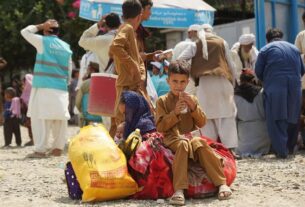In Belem, Brazil, as the United Nations climate summit (COP30) convened, I marched alongside thousands of activists and Indigenous peoples calling on governments to urgently address climate change and protect human rights.
As previous host countries restricted such demonstrations, the November 15 march was exhilarating. However, despite clear—and powerful—calls from civil society for the summit to take bolder steps on climate change and to uphold human rights, COP30 failed to make progress on two key issues: fossil fuels and deforestation.
Human Rights Watch has researched how communities near coal, oil, and gas sites face severe harms, and how Indigenous peoples and other forest-dependent communities continue to face violence and land grabs. Ahead of the summit, Brazilian President Luiz Inácio Lula da Silva urged countries to agree on “roadmaps” to transition away from fossil fuels and to end the deforestation that has been disastrous for the country’s Indigenous communities. During negotiations, more than 80 countries—led by Colombia and supported by climate-vulnerable states—pushed for a roadmap on fossil fuels to be reflected in the final negotiated text.
But this momentum was opposed by producer countries including India, Russia, and Saudi Arabia, and the final text does not mention fossil fuels and avoids any concrete commitments or deadlines towards a phaseout. Similarly, the COP30 final text omitted a deforestation roadmap or binding commitments to protect forests, falling short of scientific evidence and the demands of frontline communities.
The most promising initiatives now appear outside of the formal COP process. While details remain limited, the Brazilian presidency announced the creation of two roadmaps: one for phasing out fossil fuels and another on ending deforestation. The next concrete step on the phaseout of fossil fuels is a conference to be co-hosted by Colombia and the Netherlands in April 2026.Within the COP30 process, countries agreed to establish a mechanism on the just transition, committed to tripling adaptation finance by 2035, and took the unprecedented step of recognizing “the rights of Indigenous Peoples, as well as their land rights and traditional knowledge” in the final COP30 decision.
But for a summit intended to advance global efforts to stabilize greenhouse gas concentrations, the failure to make any tangible progress on fossil fuels and deforestation means COP30 fell far short of what is needed to protect people and the planet.


